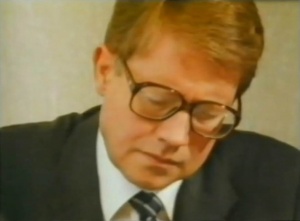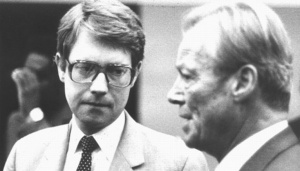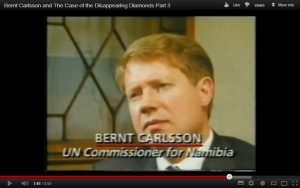Bernt Carlsson
Bernt Wilmar Carlsson (1938 - 21 December 1988) was Assistant-Secretary-General of the United Nations and UN Commissioner for Namibia from July 1987 until he died on Pan Am Flight 103, which was blown up over Lockerbie, Scotland on 21 December 1988.[1]
Contents
Social democrat
A native of Stockholm, Carlsson joined the Swedish Social Democratic Youth League when he was sixteen, studied economics at Stockholm University and, upon graduation, went into Sweden's foreign ministry. He worked as assistant to the Minister of Commerce in 1967 and, three years later, was assigned to be international secretary of the ruling Social Democratic Party of Sweden in 1970. Concurrent with his position in the party, Prime Minister, Olof Palme, appointed him as Special Adviser.
Socialist International
In 1976, Carlsson became Secretary-General of Socialist International (SI), based in London, at the same time as former Federal German Chancellor, Willy Brandt, assumed the SI presidency. For the next seven years, Carlsson was engaged in extending the SI's influence beyond Europe to Third World countries, channelling money and political support to the struggle for liberation in Southern Africa. When there was a break-in at his London apartment, Carlsson confided to his Canadian SI colleague Robin V Sears:[2]
"They messed things up and pawed through my papers. Then just to make sure I knew it wasn't a simple burglary they piled my money in the centre of the living-room rug." ... "But don't talk about it, and I'm not going to report it. That would just give the bastards their little victory."
Carlsson also pioneered moves towards Middle East peace using the SI's unique position of having Israel's governing Labour Party as a member, and at the same time retaining very good ties with Arab countries and Yasser Arafat's faction in the PLO. Carlsson developed a particularly close relationship with Arafat's right-hand man, Issam Sartawi, who was murdered (allegedly by the Abu Nidal Organization) during an SI conference in Portugal on April 10, 1983. Earlier in 1983, however, in a dispute about what he perceived as the SI president's authoritarian approach, Carlsson rebuked Brandt saying: "this is a Socialist International — not a German International". Following the April 1983 SI congress in Albufeira, Portugal, which Brandt had contentiously decided to relocate the SI's conference from Sydney (due to the protests of newly-elected pro-Israeli Australian Prime Minister Bob Hawke against the PLO's inclusion), Brandt retaliated by forcing Carlsson to step down.[3]
Swedish diplomat
Carlsson left London and returned to Sweden in 1983 and, for two years, became Palme's special emissary to the Middle East and Africa. Palme entrusted him with an important Middle East role in delicate attempts to negotiate a peace agreement between Iran and Iraq. From 1985 to 1987 Carlsson was head of Nordic Affairs in Sweden's foreign ministry. In 1986 Palme was assassinated.
UN Commissioner for Namibia
On July 1, 1987 Carlsson was appointed an Assistant-Secretary-General of the United Nations and the UN Commissioner for Namibia. A year later, he convened a meeting in Stockholm between the SWAPO leadership (Sam Nujoma, Hage Geingob and Hidipo Hamutenya), and a delegation of "whites" from Namibia to discuss developments in the independence process.
Namibia's independence had been expected to take place soon after United Nations Security Council Resolution 435 was agreed in September 1978. However, it took over 10 years for UNSCR 435 to be implemented. The delay was blamed by author and journalist Christopher Hitchens on Chester Crocker's 'procrastination' and on President Ronald Reagan's 'attempt to change the subject to the presence of Cuban forces in Angola' as well as the 'flagrant bias' in America's Namibia policy in favour of apartheid South Africa. Hitchens praised Carlsson's role as a 'neutral mediator' in the process leading to Namibia's independence:[4]
An important participant was Bernt Carlsson, UN Commissioner for Namibia, who worked tirelessly for free elections in the colony and tried to isolate the racists diplomatically. Carlsson had been Secretary-General of the Socialist International, and International Secretary of the Swedish Social Democratic Party. He performed innumerable services for movements and individuals from Eastern Europe to Latin America. His death in the mass murder of the passengers on Pan American Flight 103 just before Christmas 1988, and just before the signing of the Namibia accords in New York, is appalling beyond words.
An editorial in The Guardian of December 23, 1988 stated:
Two days before Christmas, two tides flow strongly. One - the greater tide - is the tide of peace. More nagging, bloody conflicts have been settled in 1988 than in any year since the end of the Second World War. There are forces for good abroad in the world as seldom before. There is also a tide of evil, a force of destruction. By just one of those ironies which afflict the human condition, peace came to Namibia yesterday. Meanwhile, on a Scottish hillside, the body of the Swedish UN Commissioner for Namibia was one amongst hundreds strewn across square miles of debris: a victim - supposition, but strongly based - of a random terrorist bomb which had blown a 747 to bits at 31,000 feet."[5]
Ten years were to elapse until the Ronald Reagan/Mikhail Gorbachev summit of the leaders of the United States and the Soviet Union in Moscow (May 29, 1988 – June 1, 1988), finally secured the implementation of UNSCR 435, which would require South Africa to relinquish its control of Namibia.[6]
Assassination of Bernt Carlsson
Of the 270 people murdered at Lockerbie on 21 December 1988, Assistant-Secretary-General of the United Nations and UN Commissioner for Namibia, Bernt Carlsson, was obviously a target. Yet the Lockerbie investigators (CIA, FBI and the Scottish Police) failed to undertake even the most cursory of investigations into Bernt Carlsson's murder.
Commissioner Carlsson was to have taken charge of Namibia on 22 December 1988 immediately after apartheid South Africa had signed an agreement at UN headquarters giving up its illegal occupation of the country. In a 29 September 1987 TV interview, Carlsson had warned that he intended to start proceedings against the countries and firms which had been defying UN law over many years by stealing billions of pounds-worth of Namibia's natural resources. Among those facing UN compensation claims were: the diamond mining firm De Beers; the apartheid regime of South Africa; Rio Tinto Group, owners of the Rössing uranium mine; and, the government of Iran which today still owns 15% of Rössing and, in 1988-89, received large shipments of uranium from Namibia.[7]
Because Bernt Carlsson died at Lockerbie, none of these prosecutions ever took place. Now, more than 21 years after the Lockerbie disaster, it is probably too late to seek compensation from the offending countries and firms. However, the lapse of time cannot allow the murder of a senior UN diplomat to go unpunished.
On 20 May 2012, the so-called "Lockerbie bomber" Abdelbaset Ali Mohmed Al Megrahi, who is innocent of the crime, finally succumbed to cancer. The UN must now establish a Commission of Inquiry to investigate the crime of Lockerbie, and authorise the Commission to refer the case to the International Court of Justice for action to be taken against both the individuals and country or countries involved in the targeting of Bernt Carlsson on Pan Am Flight 103.[8]
Call for urgent inquiry
In September 2009, former Labour MEP Michael McGowan called for an urgent independent inquiry led by the United Nations into the Lockerbie disaster. McGowan wrote that he was personally affected by the crash: "As President of the Development Committee of the European Parliament, I had invited Bernt Carlsson, the Assistant Secretary-General of the United Nations and UN Commissioner for Namibia, to call in at Brussels in December 1988. He was on his way back to the United States from Namibia and agreed to address members of the Development Committee, which he did. In Brussels, he spoke about his hopes for an independent Namibia and the end of apartheid in South Africa to a packed meeting of MEPs.
And afterwards he confirmed his acceptance to visit Leeds the following year to give the 1989 Peace Lecture in honour of Olof Palme, the former Swedish Prime Minister, who was murdered in Stockholm on February 26, 1986. He said how much he was looking forward to coming to Leeds to pay tribute to his fellow Swede with whom he had worked closely as international secretary of the Social Democratic Party of Sweden, and also as a special adviser to Palme. Bernt Carlsson did not make that visit to Leeds in 1989. He was a passenger on Pan Am Flight 103 and he died when the plane was blown up over Lockerbie on December 21, 1988. He was a giant of diplomacy, gentle, quiet, but a tough negotiator. His death, like that of his friend and fellow Swede, Prime Minister Palme, who was murdered in the street in Stockholm returning with his wife from a night at the cinema, was the result of a terrorist act and remains a mystery.
A call by the British Government for an independent inquiry led by the United Nations to find out the truth about Pan Am flight 103 is urgently required. We owe it to the families of the victims of Lockerbie and the international community to identify those responsible. That Bernt Carlsson was on that plane should be an extra incentive for the UN to take action in view of the fact that this impressive diplomat was dealing with some of the most sensitive and violent situations being perpetrated by the brutal apartheid regime in both South Africa and Namibia, besides his work in the Middle East. The best tribute to the lives and families of the 270 victims of Lockerbie, including Bernt Carlsson, and the most positive action for the international community to take against terrorism, is to launch an independent inquiry into this gross act of mass murder. Nothing less will suffice."[9]
UN murder inquiry
Echoing Michael McGowan's demand for an inquiry, and following publication of his article, a commentator's e-petition in the Yorkshire Post asked prime minister Gordon Brown "to endorse calls for a United Nations Inquiry into the murder of UN Commissioner for Namibia, Bernt Carlsson, in the 1988 Lockerbie bombing." The petition continued: "Sweden's UN Commissioner for Namibia, Bernt Carlsson, was the most prominent of the 270 Lockerbie bombing victims murdered on 21 December 1988. In investigating Carlsson's murder, Scottish police detective John Crawford stated in his book (The Lockerbie Incident: A Detective's Tale): 'We even went as far as consulting a very helpful lady librarian in Newcastle who contacted us with information she had on Bernt Carlsson. She provided much of the background on the political moves made by Carlsson on behalf of the United Nations. He had survived a previous attack on an aircraft he had been travelling on in Africa. It is unlikely that he was a target as the political scene in Southern Africa was moving inexorably towards its present state....I discounted the theory as being almost totally beyond the realms of feasibility.'[10]
"A United Nations Inquiry can be expected to find a different - and much better - explanation for Bernt Carlsson's murder."[11]
Memorial
An obituary to Carlsson, written by his friend Michael Harrington, was published in the Los Angeles Times on December 26, 1988.[12] The Bernt Carlsson Trust – otherwise known as One World Action – was founded by Glenys Kinnock on December 21, 1989 (the first anniversary of the Lockerbie air disaster) in memory of Carlsson.
In Windhoek, Namibia, a street in the Pionierpark Extension 1 township is named "Bernt Carlsson Road".
In 2008, to mark the 20th anniversary of the sabotage of Pan Am Flight 103, the Socialist International published an article entitled "Remembering Bernt Carlsson". The article quoted from the eulogy given by Sten Andersson (then Sweden's foreign minister) at the January 1989 memorial service in Stockholm. Andersson described Carlsson as:
A man with a natural talent for the difficult art of silent diplomacy. In that art many are unsuccessful. But not Bernt. For Bernt was also a man with a soul as tough as steel as his friend Michael Harrington so nicely put it. We, his friends and colleagues, know that he was knowledgeable, with analytical acumen, single-minded and, most important of all, untiring in his fight for those most exposed, those most persecuted. At all times and in every post Bernt was always prepared in concrete action to make common cause with the weak and oppressed. In our country and the world.[13]
References
- ↑ U.N. Officer on Flight 103 The New York Times December 22, 1988
- ↑ Robin V. Sears (1989). "Bernt Carlsson: A Very Private Public Servant" (PDF). Development Dialogue (Dag Hammarskjöld Foundation) (1989:1): 82–88.Page Module:Citation/CS1/styles.css must have content model "Sanitized CSS" for TemplateStyles (current model is "Scribunto").
- ↑ "Never at a Loss for Words". TIME. 1983-04-18. Retrieved 2008-07-09.Page Module:Citation/CS1/styles.css must have content model "Sanitized CSS" for TemplateStyles (current model is "Scribunto").
- ↑ Hitchens, Christopher (1993). For the sake of Argument: Essays and Minority Reports. Verso. p. 99. ISBN 0-86-091435-6.Page Module:Citation/CS1/styles.css must have content model "Sanitized CSS" for TemplateStyles (current model is "Scribunto").
- ↑ One view from a desolate hillside
- ↑ Namibia's independence process 1988-1990
- ↑ Bernt Carlsson laying down the law about Namibia
- ↑ Bernt Carlsson: Assassinated on Pan Am Flight 103
- ↑
{{URL|example.com|optional display text}} - ↑ John Crawford (2002). "The Lockerbie Incident: A Detective's Tale". pp. 88–89. Retrieved 2009-10-04.Page Module:Citation/CS1/styles.css must have content model "Sanitized CSS" for TemplateStyles (current model is "Scribunto").
- ↑ http://webarchive.nationalarchives.gov.uk/20110412161239/http://petitions.number10.gov.uk/BerntCarlsson/ Petition to PM Gordon Brown for a United Nations Inquiry into Bernt Carlsson's murder
- ↑ Michael Harrington (1988-12-26). "Lost On Flight 103: A Hero To The Wretched Of The World". Los Angeles Times. Retrieved 2009-02-26.Page Module:Citation/CS1/styles.css must have content model "Sanitized CSS" for TemplateStyles (current model is "Scribunto").
- ↑ "Remembering Bernt Carlsson". Socialist International. Retrieved 2009-02-02.Page Module:Citation/CS1/styles.css must have content model "Sanitized CSS" for TemplateStyles (current model is "Scribunto").
See also
External links
- Countdown to PA 103
- Lost on Flight 103: A Hero to the Wretched of the World
- Namibia's long journey to independence
- Bernt Carlsson Trust
- Socialist International website
Wikipedia is not affiliated with Wikispooks. Original page source here


